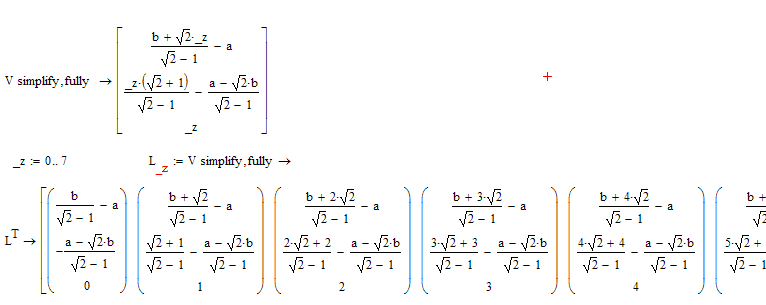Community Tip - Visit the PTCooler (the community lounge) to get to know your fellow community members and check out some of Dale's Friday Humor posts! X
- Subscribe to RSS Feed
- Mark Topic as New
- Mark Topic as Read
- Float this Topic for Current User
- Bookmark
- Subscribe
- Mute
- Printer Friendly Page
Solve, X.
- Mark as New
- Bookmark
- Subscribe
- Mute
- Subscribe to RSS Feed
- Permalink
- Notify Moderator
Solve, X.
- Labels:
-
Other
Accepted Solutions
- Mark as New
- Bookmark
- Subscribe
- Mute
- Subscribe to RSS Feed
- Permalink
- Notify Moderator
??Absolutely not sure what the question is. What should X be? Ther term for x from the first example??
As Alan pointed out, the second system will not have a unique solution. If it has no solution at all or an infinite number of solutions depends on the rank of the extended matrix. If its 3, we will have no solution, if its 2 there is an infinite number of solutions. The latter case is for X=(sqrt(2)-1)*(a+b).
Mathcads result is inaccurate and misleading, but MC can do better using "fully":

- Mark as New
- Bookmark
- Subscribe
- Mute
- Subscribe to RSS Feed
- Permalink
- Notify Moderator
The determinant of the matrix multiplying the vector of (x, y, z) is zero.
An nxn nonhomogeneous system of linear equations has a unique non-trivial solution if and only if its determinant is non-zero. If the determinant is zero, then the system has either no nontrivial solutions or an infinite number of solutions.
Alan
- Mark as New
- Bookmark
- Subscribe
- Mute
- Subscribe to RSS Feed
- Permalink
- Notify Moderator
Thanks for your response. I agree with you, Alan. And I'm also observing those ( for example ) :
Best Regards.
- Mark as New
- Bookmark
- Subscribe
- Mute
- Subscribe to RSS Feed
- Permalink
- Notify Moderator
Something like this?

- Mark as New
- Bookmark
- Subscribe
- Mute
- Subscribe to RSS Feed
- Permalink
- Notify Moderator
??Absolutely not sure what the question is. What should X be? Ther term for x from the first example??
As Alan pointed out, the second system will not have a unique solution. If it has no solution at all or an infinite number of solutions depends on the rank of the extended matrix. If its 3, we will have no solution, if its 2 there is an infinite number of solutions. The latter case is for X=(sqrt(2)-1)*(a+b).
Mathcads result is inaccurate and misleading, but MC can do better using "fully":






